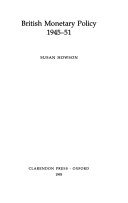The first majority Labour government in Britain was pledged to maintain full employment, reform the financial system and nationalize major industries. It faced a massive balance-of-payments problem and a persistent threat of inflation. The first postwar Chancellor of the Exchequer, Hugh Dalton, nationalized the Bank of England, but his time at the Treasury is notorious for his attempt to drive down already low nominal longterm interest rates to 2.5%. His successors as Chancellor, Stafford Cripps and Hugh Gaitskell, also failed to give monetary policy any role in fighting inflation, relying on disinflationary budgetary policy after the balance-of-payments crisis of 1947. Using records of the Labour Party, Treasury, the Bank of England and other participants in the discussions of the time, this study explains the reasons for Dalton's pursuit of cheaper money in 1945-47 and for the continuation of cheap money until the advent of a Conservative government in 1951. It also examines the consequences of Labour's monetary policies in the light of modern economic theory, as well as considering why Labour's financial reform was so limited.
- ISBN10 0198286562
- ISBN13 9780198286561
- Publish Date 1 September 1993
- Publish Status Out of Print
- Out of Print 7 April 2000
- Publish Country GB
- Publisher Oxford University Press
- Imprint Clarendon Press
- Format Hardcover
- Pages 382
- Language English
